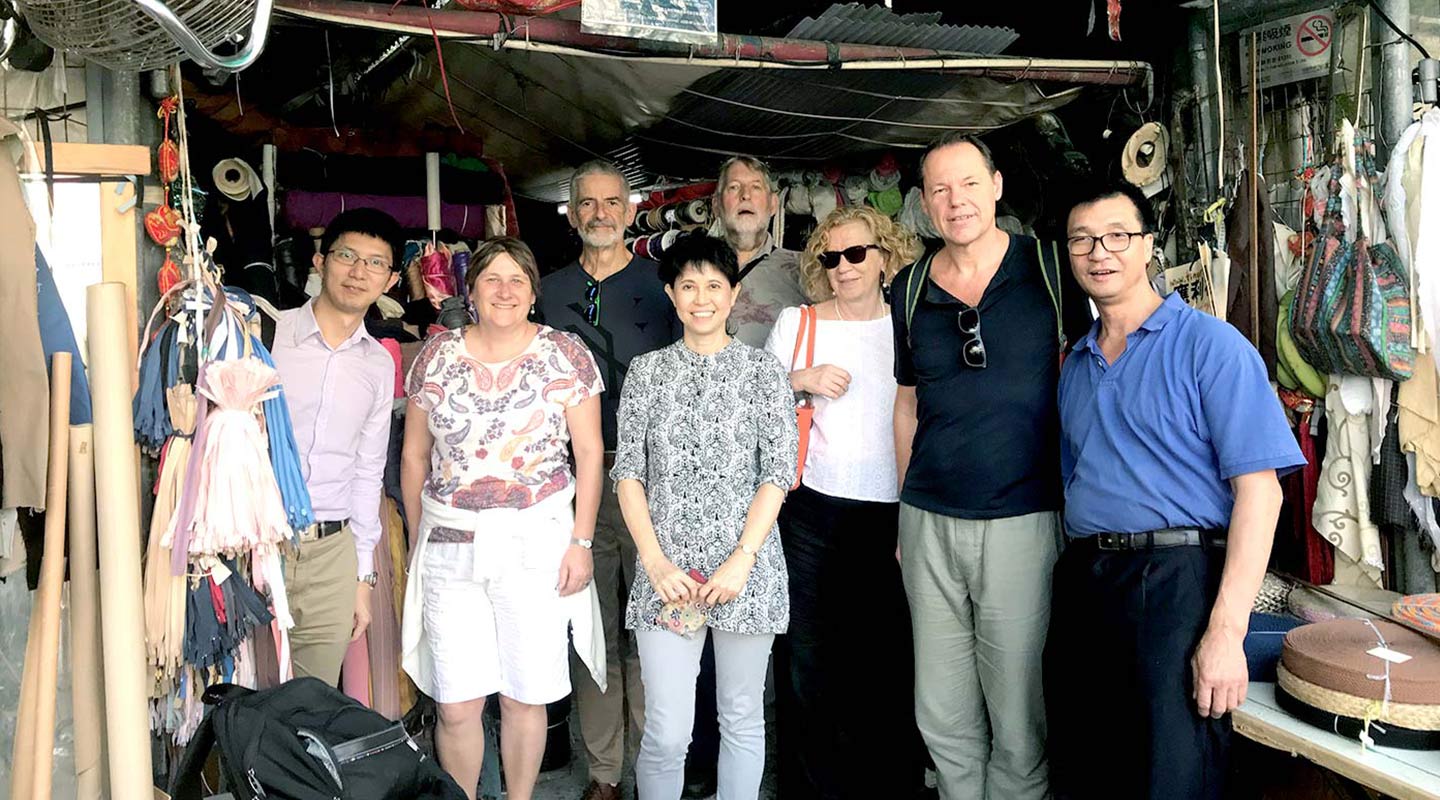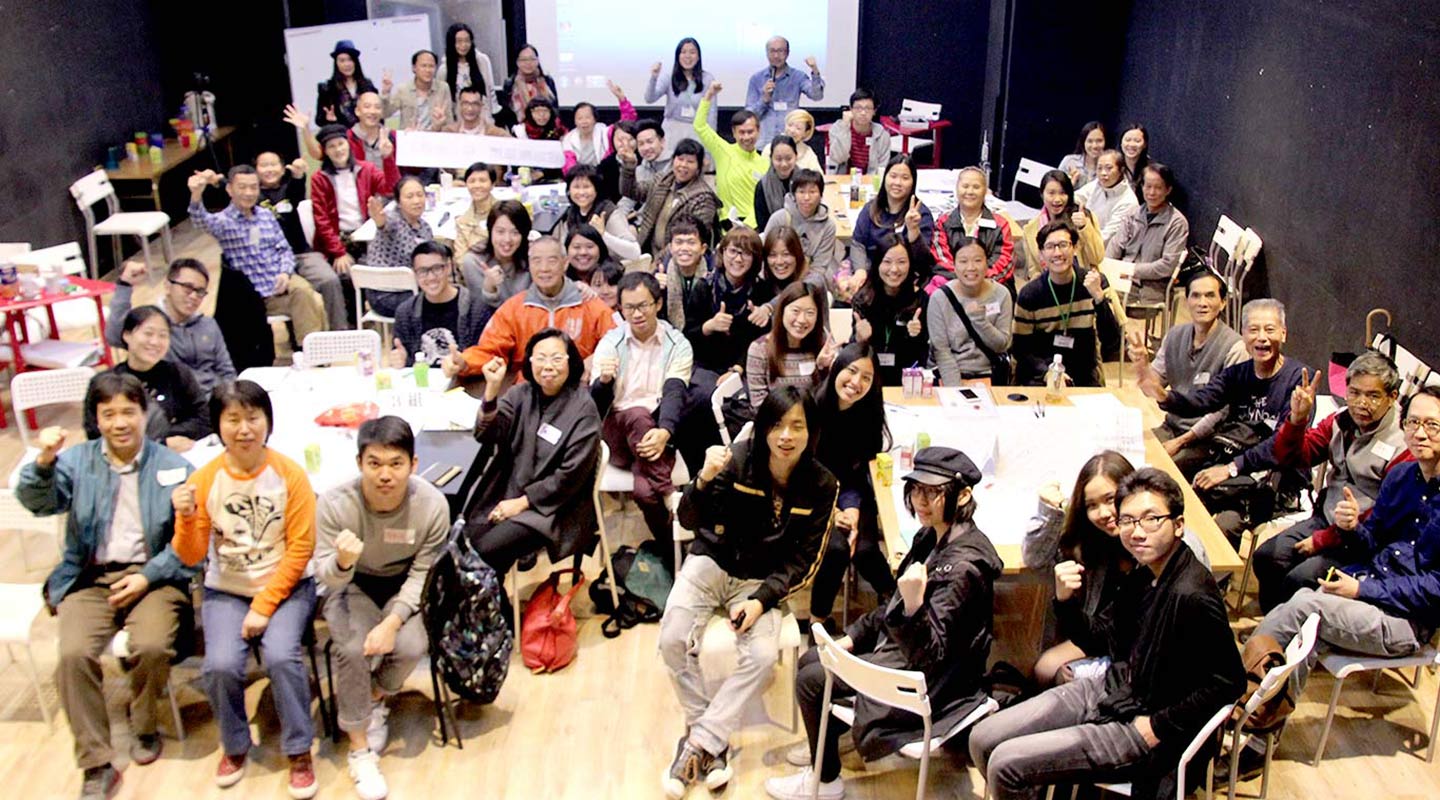Dear readers, With the launch of e-newsletter CUHK in Focus, CUHKUPDates has retired and this site will no longer be updated. To stay abreast of the University’s latest news, please go to https://focus.cuhk.edu.hk. Thank you.
How Ng Mee-kam has helped revive a Hong Kong hawker market

What the government saw as an eyesore in the form of a run-down fabric market on the crowded Kowloon peninsula, others saw as an opportunity. Even the fabric merchants who make up the Pang Jai Fabric Market did not recognize its own value until encouraged to take a more expansive view of its importance by urban planners at The Chinese University of Hong Kong.
The ramshackle fabric bazaar took shape in 1978 on Yen Chow Street in the neighborhood of Sham Shui Po. That’s when the government moved some 100 textile vendors off nearby streets and onto a ‘temporary’ site opposite the Sham Shui Po Police Station. With a patchwork of tarpaulin and tin roofs covering a tight cluster of stalls selling bolts of fabric, the site resembles a squatter’s village. Yet the market has spawned the careers of Hong Kong fashion designers, lured celebrities and dignitaries to shop there, and supported the lives of many merchants.
That was until 2000, when the government decided to evict the merchants to make way for public housing. That effort picked up pace in 2015, when the government sent letters telling the hawkers that it would redevelop the site. The decision led to protests and, eventually, an effort to organize the vendors in a bid to find a new site and create a new identity for the market.
The effort to re-create the market continues with searching for a site. But the mobilization of the many interested parties seeking to save the merchants has already seen the Pang Jai Fabric Market’s planning group win the inaugural Wendy Sarkissian Courage Award, created by the Canadian-born, Australia-based planner to identify and celebrate the best in community-engagement practice. Adding to the list of awards is the Silver Award from the Hong Kong Institute of Planners.

Prof. Mee-kam Ng, Director of CUHK’s Urban Studies Programme, is one of the instigators behind the initiative to salvage the market. To Professor Ng, preserving this part of Hong Kong’s mercantile and social identity embodies the mission of CUHK to foster the development of both global citizens and social enterprises.
The concept of ‘sustainability’ means different things to different people. For urban planners, there are three facets to sustainable development.
‘We need to always do things simultaneously that are socially, environmentally and economically resilient,’ Professor Ng says.
Yet planners, property surveyors, real-estate developers and government officials frequently don’t see eye to eye. The public utility of a city space is often viewed only in its economic importance. While a focus on making money is important to society, to a planner it should not be the only or even primary goal.
The hawkers themselves did not have the confidence to negotiate with the government for an equitable relocation. Rather, they were offered HK$60,000 to move their stores to a former wet market that did not suit their needs – or else.
The inferiority complex stemmed in part from the legal status of the merchants. The fabric sellers used to operate under license as hawkers, originally on nearby Yu Chau Street before being moved to make way for new bus lanes and the construction of the Tsuen Wan Line of the MTR subway system. So this eviction from Yen Chow Street is the second time they’ve been forced to move.
The government has long stopped granting new hawker licenses. That left only three of the incumbent merchants with the necessary permits. They found a workaround through a system that allows them in turn to hire assistants, who can be licensed as such. As a result, the government recognized 33 of the hawkers but had not recognized the status of another 17. The government apparently viewed this as sufficient concession to show goodwill.
Professor Ng and her CUHK team joined with other planners, architects, designers, trade unionists, landlords and volunteers to hold workshops and brainstorming sessions to help the hawkers re-imagine the market. Now the ‘temporary’ market that has lasted 39 years will seek a permanent home. It will, if all goes to plan, not only provide purpose-built space for the fabric merchants who insist on remaining but also include workshops, exhibition areas, design studios and socio-historical exhibitions.
That would be the culmination of a recognition that the cloth market serves a broader purpose – even though the hawkers would rather get on with what they are good at. The best resolution, of course, would be for them to put the changes in place right where they are now.

‘We are very excited as professionals about these awards,’ Professor Ng says. ‘The fabric sellers are also happy, but that’s not their real concern. Their concern is their livelihood. That’s fair enough.’
The social activists have also helped organize tours to explore the ‘commons’ that the hawkers have helped to create, a social space that contributes to the public good. And they have helped the hawkers to organize in their efforts to stake their claim.
The hawkers want to preserve their profession but also, with a bit of encouragement, have started to see its broader value. The outpouring of support behind their efforts to remain in operation made the merchants realize that, quite literally, they are making a contribution to the fabric of society.
By Alex Frew McMillan
This article was originally published on CUHK Homepage in Jan 2018.